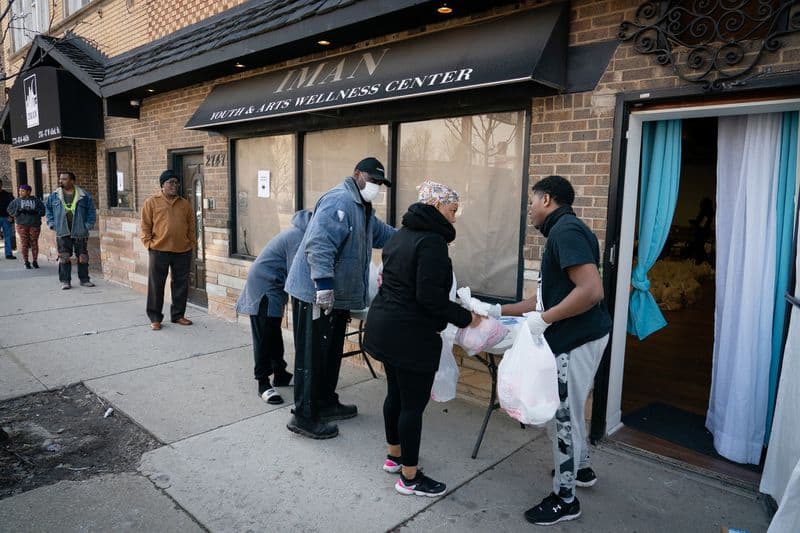
December 19, 2025
Chicago Beyond 2025 Recap
2025: Proximity Leads From health to justice, Chicago Beyond invests in people closest to the issues and driving change all across the country. This year,
Read More
This article ran online in The Chicago Tribune on April 3, 2020. By Darcel Rockett
Rosa Gaytan was at Sanad Social Services in West Lawn before 10 a.m. Wednesday with her children, ages 9 and 5, picking up food items for herself and her brother — who have lost their jobs as a waitress at a nearby restaurant and a worker at a mattress factory, respectively.
The Chicago Lawn resident was able to get two bags with groceries like beans, oatmeal, rice, peanut butter, fruits and vegetables, eggs and chocolate truffles.
“I found this pantry when I was Googling,” she said. “I’m looking for other locations. Maybe I’ll come back next week.”
A rise in unemployment and the closing of food pantries are exacerbating the problem of food insecurity around the Chicago area. In food deserts, areas where people live more than a mile from a grocery store, it’s getting even harder to find fresh, healthy foods. The United States Department of Agriculture classified 39 census tracts in Cook County as food deserts in 2010 — among those tracts were areas in West Pullman, Pullman, Woodlawn, Roseland, Riverdale and Englewood. Outside of Chicago, most of the tracts were in Thornton, Bloom, Bremen, Calumet and Worth. In the meantime, about one-third of the Greater Chicago Food Depository network pantries have closed due to coronavirus, according to spokesperson Greg Trotter.
“People who had never had to come and ask for food are reaching out,” said Aber Abueid, Sanad’s food pantry manager. “On a regular monthly basis, we usually order, like 11-12,000 pounds of food, but this time we had to order over 40,000 pounds — the need is so great. We used to open twice a month; now we’ll be open every week in April.
“We’re buying more food because we have to,” he said. “We’re getting a lot less from grocery stores right now because of the run on grocery stores, but we’ve been building thousands of boxes of nonperishable food items to help support our partners that are still open. Some food pantries have geographic boundaries, but many of them are dropping their boundaries because we’ve had closures, so they are seeing people that they haven’t seen before.”
Maria Ruiz, of Brighton Park, drove over with her youngest son, Alejandro, 29, and her oldest daughter, Cindy, 35. A clerk at St. Bernard Hospital, Maria said she hasn’t been able to work because she has to stay at home with Alejandro, who has a developmental delay.
“My job is important, but my son is also important,” she said. “I’m having a very hard time because he’s special and doesn’t understand about no touching, distancing.”
It was the family’s first visit to Sanad’s pantry. Cindy heard about it from one of her neighbors.
Araceli Pizano, a Sanad volunteer for the past eight years, was handing out food packages on tables marked with tape to make sure people were staying separated. People would walk up or pull up in their cars, put their ZIP code and the number of people in their family on a sheet of paper, and walk away with the food packages.
Trotter said it helps that Chicago Public Schools is continuing to provide student meals. Also the University of Chicago’s on-campus dining facilities are preparing meals to be distributed in partnership with the Greater Chicago Food Depository to locations on the South Side through June 12, helping to make sure no one falls through gaps in coverage.
“It’s all helping at this point,” Trotter said. “That’s been one great thing about this — all of the partnerships that have emerged. … We’re all in communication with each other, collecting data, sharing information on where the gaps of service are, and that’s all good.
“The concern is the longer this goes on, the harder it’s going to be for our most vulnerable neighbors and working families who are in a tough financial spot, who may have less income because of the work stoppages or business closings, and they have increased costs because of the school closings. It’s very likely that many people will experience food insecurity for the first time as a result of this.”
In the last three weeks, Trottter said, the depository’s benefits outreach team of about 16 has been busy connecting people to the Supplemental Nutrition Assistance Program (SNAP) and Medicaid. Calls to its hotline have significantly increased: The week of March 9, it received 203 calls; the week of March 16, 1,094; and last week, there were 1,721. Most of the calls are from clients who were recently laid off and seniors, Trotter said.
The Inner-City Muslim Action Network (IMAN) in West Lawn is doing rounds of food packaging and distribution for folks in the Englewood and Chicago Lawn neighborhoods and to some of its health center clients, said senior organizer Sara Hamdan. It’s partnering with Teamwork Englewood, Resident Association of Greater Englewood (R.A.G.E.) and Chicago Beyond in supporting this effort to continue to get emergency food packages out to folks.
On Friday, Chicago Beyond launched its hyperlocal response to the pandemic with an initiative that will deliver basic necessities to people on Chicago’s South and West sides through IMAN (and other hyperlocal nonprofits). The campaign gave $250,000 worth of nonperishable food items, toilet paper and paper towels (a total of 32,000 pounds) for about 2,200 families, according to Liz Dozier, founder and CEO of Chicago Beyond. She said the endeavor will continue at least until May 1. The goal is to support 5,000 families a week.
“People’s basic health is at stake here … and my philosophy has always been you meet people where they are, so obviously with COVID and what’s happening now, there are incredible needs popping up,” Dozier said. “It’s food today, but who knows what it will be like in four weeks, six weeks and three months from now, so I think it’s Chicago Beyond’s responsibility to be keep our ears to the ground and make sure we’re doing whatever we can with whatever is in our power to meet those needs.”
From its Corner Store campaign to its Farmers Market that typically begins in July, IMAN’s work around food is very much a part of its ethos, Hamdan said.
“There’s going to continue to be difficult decisions for families over the next several weeks, even months, where people are having to decide whether they pay a bill or whether they put food on the table for their families and all the fear and anxiety around leaving the house,” she said. “The last few weeks, we knew that our food ecosystem work was going to have to continue, but it was also very much going to have to respond to this moment.”
Growing Home, a farm-based training program in Englewood for people with employment barriers, is looking at how to support its alumni and the new cohort that was set to start a job training program March 31. Since the trainees can’t come in, the organization is connecting them to services like local food banks, counseling and employment opportunities for essential businesses looking for employees, said Danielle Perry, Growing Home’s executive director.
“We’re doing that and still managing our farm. We have to shift our model from farmers markets to a delivery model,” she said. “You call us, tell us what you want, you pay online, and we put it on your doorstep. It’s a big change for us.”
Teamwork Englewood is in the process of pivoting its services to meet current needs as well, said Cecile De Mello, executive director. Its clientele is a mix of youths, people returning to communities after prison, Englewood residents and female heads of households. The most pressing calls center on needs for food, supplies like paper towels and toilet paper, and rental assistance.
“We’re calling our clients and letting them know that we can support them in different ways than we traditionally have — some of that being food support,” she said. “I’ve been spending most of my time seeing how we can repurpose our current funds and grants to support families in this time.”
On Thursday and Friday, the organization delivered food and gift cards to community members with the support of IMAN. More information and a way to donate to the organization can be found here. The Greater Chicago Food Depository’s website allows people to search by ZIP code to find food pantries within a 2-mile radius; you will also see a way to donate to the group on the site. For ways to help other Chicago nonprofits, see the Tribune’s running list here.
“A lot of people are relying on us. It’s a responsibility, and we have to help one another,” Sanad’s food pantry manager Abueid said. “Usually we’d serve around 300 a month, but because of what’s going on, the last food pantry saw over 250 families in one week. We don’t turn anybody away.”

December 19, 2025
2025: Proximity Leads From health to justice, Chicago Beyond invests in people closest to the issues and driving change all across the country. This year,
Read More
December 1, 2025
National philanthropic organization Chicago Beyond hosted its second National Justice Convening Oct. 29-30 in Chicago. The gathering aimed to improve safet
Read More
November 7, 2025
At its second National Justice Convening, Chicago Beyond, a national philanthropic organization addressing systemic inequity by backing solutions led by t
Read More